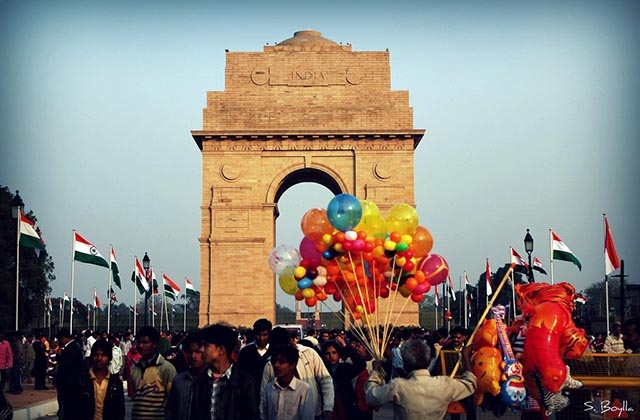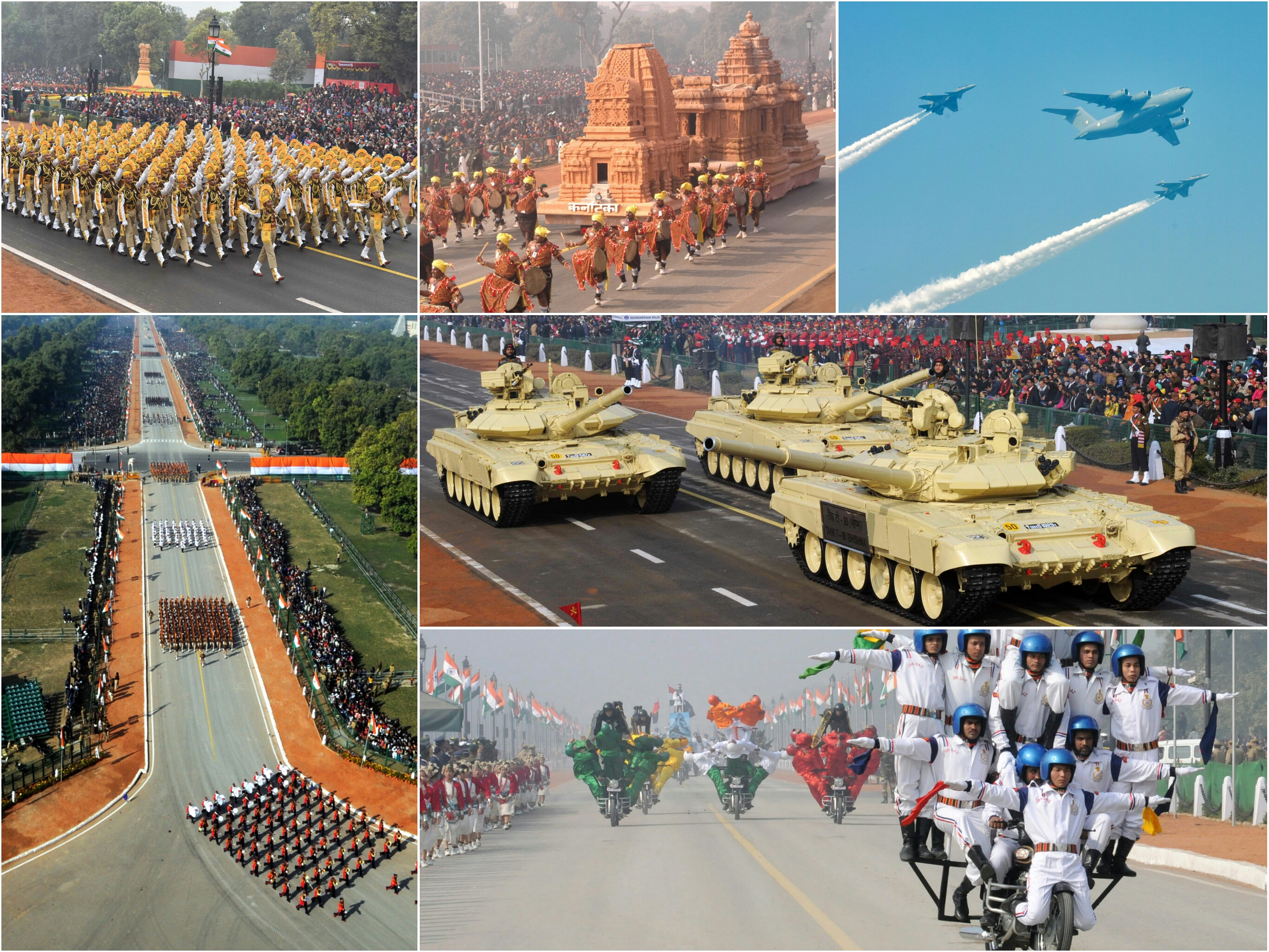
Indian Republic Day is celebrated on January 26th to commemorate the day when the Constitution of India came into effect. Indian Republic Day marks the historic moment when India transitioned from being a British colony to a sovereign democratic republic.
On this day, the Indian Constitution was adopted, laying the foundation for a democratic and secular nation. It is celebrated with great enthusiasm and patriotic fervor throughout the country, showcasing the diverse cultural heritage and military prowess of India. The main highlight of the day is the Republic Day parade in New Delhi, where the President of India hoists the national flag and grand processions take place, displaying the country’s unity in diversity.
Indian Republic Day is a time to honor the brave freedom fighters and visionary leaders who made the dream of a democratic India a reality.
The History And Significance Of Indian Republic Day
Indian Republic Day, held on the 26th of January every year, commemorates the day when the Constitution of India came into effect in 1950. This significant event marked the transition of India into an independent and sovereign republic nation. It replaced the Government of India Act (1935) as the governing document of India, rendering the country a democratic republic.
Origin And Evolution Of Indian Republic Day
The journey towards Indian Republic Day began with the Indian National Congress adopting the idea of Purna Swaraj (complete self-governance) on 26th January 1930. However, it was only after several years of struggle and countless sacrifices that the Indian Constitution was ultimately adopted. The drafting of the Constitution was a comprehensive process, headed by Dr. B.R. Ambedkar, who is regarded as the principal architect of the Indian Constitution.
The Indian Republic Day celebration is marked by a grand parade in the national capital, New Delhi. The President of India hoists the national flag, and the military, cultural, and social achievements of the nation are showcased during this event.
The Importance Of 26th January In Indian History
26th January holds immense importance in Indian history as it signifies the day when India became a republic, governing itself by its own laws and principles. It symbolizes the culmination of the Indian independence struggle and the triumph of democracy.
| Key highlights | Significance |
|---|---|
| The adoption of the Indian Constitution | Established India as an independent republic |
| Recognition of fundamental rights and duties | Ensured the protection of citizen rights and responsibilities |
| Secular and democratic governance | Upheld the principles of equality and secularism |
| Representative form of government | Empowered citizens to choose their leaders through democratic processes |
Key Events And Traditions Of Indian Republic Day Celebrations
Indian Republic Day is celebrated on 26th January every year to commemorate the day when the Constitution of India came into effect. This day holds immense significance for every Indian and is marked by various events and traditions.
Flag Hoisting and Salute to the National Flag: The day begins with the hoisting of the Indian national flag by the President of India at the Rajpath in New Delhi. This is followed by the singing of the national anthem and a 21-gun salute as a mark of respect and honor.
Presidential Address and Awards Ceremony: After the flag hoisting, the President delivers a speech to the nation, highlighting the achievements and challenges faced by the country. This is also the time when prestigious awards like the Padma Bhushan, Padma Vibhushan, and Bharat Ratna are conferred upon deserving individuals for their exceptional contributions.
Cultural Performances and Parades: The Republic Day parade showcases the diverse cultural heritage of India through vibrant performances by state contingents, folk dances, and music. The parade also includes impressive displays of military strength with marching contingents, tanks, missiles, and fighter jets.
Reflecting On India’s Achievements And Progress
India’s Republic Day is not just a celebration of independence, but also a time to reflect on the country’s achievements and progress. One of the key areas where India has made significant strides is in economic and technological advancements. The country has emerged as a global powerhouse, with a booming economy and a rapidly growing tech sector. The advancements in these areas have not only contributed to India’s overall development, but have also played a crucial role in transforming the lives of its citizens, creating employment opportunities, and fostering innovation.
Another area where India has made remarkable progress is in strengthening its democracy and governance. Over the years, the country has worked tirelessly to ensure transparency, accountability, and inclusivity in its governance systems. This has not only led to a more effective and efficient government machinery, but has also empowered citizens to actively engage in the democratic process.
India’s Republic Day also serves as a reminder of the country’s rich cultural diversity and unity. With over a thousand languages spoken and numerous religions practiced, India is a melting pot of cultures. The celebration of Republic Day showcases the unity that binds this diverse nation together, celebrating its differences and embracing its shared heritage.
Economic And Technological Advancements
Indian Republic Day is a momentous occasion that celebrates the country’s achievements in various sectors. One of the key areas where India has made significant progress is in its economic and technological advancements. Since gaining independence, the country has witnessed remarkable growth in its economy, catapulting it onto the global stage.
Post-independence, the development of infrastructure and industries has played a crucial role in driving economic growth. The government has implemented various policies and initiatives to create a conducive environment for businesses to thrive. This has led to the establishment of a robust industrial base across different sectors, contributing to job creation and revenue generation.
Moreover, the innovation and entrepreneurship culture in India has been thriving, especially in the digital era. Technological advancements and the proliferation of the internet have provided an impetus to the start-up ecosystem. Start-ups and entrepreneurs are leveraging technology to craft innovative solutions for various societal and business challenges, further propelling economic growth.
In conclusion, the Indian economy has witnessed remarkable growth in the post-independence era, driven by the development of infrastructure, industries, and the promotion of innovation and entrepreneurship. These economic and technological advancements have placed India on a path towards becoming a global economic powerhouse.
Strengthening Democracy And Governance
Indian Republic Day is a significant event that commemorates the strengthening of democracy and governance in India. The evolution of the Indian Constitution and democracy has played a crucial role in shaping the country’s governance system. The Constitution, formulated and adopted on this day in 1950, laid the foundation for a democratic and sovereign nation. Government institutions, including the legislature, judiciary, and executive, have been instrumental in upholding the principles and values enshrined in the Constitution. They ensure the proper functioning of the government, safeguard the rights of citizens, and maintain law and order. These institutions act as checks and balances, fostering accountability and transparency in the democratic process. One essential aspect of governance is ensuring social justice and protecting human rights. The Constitution of India guarantees equal opportunities and protection to all its citizens, irrespective of their caste, creed, or gender. Various policies and initiatives are implemented to address social inequalities and uplift marginalized communities, promoting inclusivity and a fair society. Indian Republic Day serves as a reminder of the continuous efforts made to strengthen democracy, uphold governance principles, and ensure social justice and human rights for all.
Celebrating Cultural Diversity And Unity
India’s Republic Day is a momentous occasion that signifies the country’s rich cultural diversity and unity. On this day, people from different walks of life come together to celebrate and showcase the nation’s heritage and traditions.
The festivities serve as a platform to promote national integration. Through various cultural programs, art exhibitions, and traditional performances, the diversity of India is highlighted and celebrated. Citizens take pride in their unique customs, languages, costumes, and cuisines, emphasizing the concept of unity in diversity.
This cultural assimilation is a strength that India proudly embraces. It fosters mutual respect, understanding, and appreciation among the various communities across the country. The celebration of Indian Republic Day serves as a reminder that despite our differences, we can come together as one nation, united in our diversity.
| Showcasing India’s Rich Heritage and Traditions |
|---|
| The celebration of Indian Republic Day provides a platform to showcase the rich heritage and traditions of the country. It includes cultural events such as dance performances, music concerts, and art exhibitions that highlight the diverse cultural tapestry of India. |
Unity in Diversity: A Strength to be Celebrated
The concept of unity in diversity has been an integral part of Indian culture since time immemorial. Indian Republic Day acknowledges and celebrates this strength, showcasing the harmony and coexistence of different religions, languages, and traditions.

Credit: en.wikipedia.org
Frequently Asked Questions For Indian Republic Day
What Is Indian Republic Day?
Indian Republic Day is a national holiday in India, celebrated on January 26th each year. It marks the day when the Constitution of India came into effect, replacing the Government of India Act (1935) as the governing document of India.
How Is Indian Republic Day Celebrated?
Indian Republic Day is celebrated with great enthusiasm and patriotism across India. The celebrations include a grand parade in New Delhi, showcasing India’s military capabilities, cultural diversity, and achievements. Flag hoisting ceremonies, patriotic songs, and cultural programs are also organized in schools, colleges, and communities.
Why Is Indian Republic Day Important?
Indian Republic Day is of great significance as it commemorates the day when India became a republic, a sovereign, socialist, secular, and democratic nation. It symbolizes the values of equality, liberty, and justice for all citizens and reminds us of our shared commitment towards building a progressive nation.
What Is The Significance Of The Indian Constitution On Republic Day?
The Indian Constitution is the cornerstone of Indian democracy, and its adoption on Republic Day holds immense significance. The Constitution outlines the fundamental rights and duties of citizens, the structure of government, and principles for a just and inclusive society.
It upholds the democratic fabric of India and provides a framework for governance.
Conclusion
In a nutshell, Indian Republic Day is a momentous occasion that marks the commemoration of the day when the Indian Constitution came into effect. It symbolizes the triumph of democracy, unity, and diversity. This day holds great significance as it reminds us of the sacrifices made by our freedom fighters and the responsibility we carry as citizens of a democratic nation.
Let’s cherish and uphold the values of our Republic and work towards a brighter, inclusive future for all.






